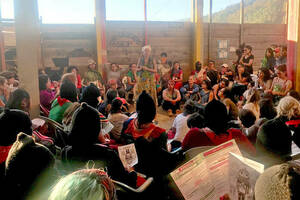 Zapatista women's summit by Global Justice Now (Flickr)
Zapatista women's summit by Global Justice Now (Flickr)
From UN Resolution 1325 (2000), which acknowledged the impact of armed conflict on women and girls and the importance of women’s full participation in peacebuilding, to international efforts to mainstream consideration of women and gender in development policy praxis, it is clear there is nothing new about the consideration of women’s roles in peacebuilding and peace research. However, twenty-two years after the UN resolution, critical intervention in the deployment of women’s rights in peace policy and practice is needed.
This issue of Peace Policy offers three such interventions that illuminate tensions between women’s constructive roles in peacebuilding and redressing gender, epistemic, structural, political, and historical injustice. The authors examine what the praxis of women and peacebuilding may obscure, namely that peace has to be feminist, which means dismantling all relations of domination as per Chiapas’ disruption of patriarchal norms (Linda Quiquivix); that a Palestinian feminist critique of “peace” opens up decolonial horizons for alternative political imaginations (Sarah Ihmoud); and that, finally, neglecting to intersect religion as integral to women and peacebuilding praxis constrains the analytic and policy scopes (Katherine Marshall).
Co-Editors for this Peace Policy issue: Ruth Carmi, Ph.D. Student in Peace Studies and Sociology, and Atalia Omer, Professor of Religion, Conflict and Peace Studies
Linda Quiquivix explores the limitations of traditional feminist conceptions of equality between genders without addressing the "relation of domination" implicit in this framework. She draws instead on a framework from Zapatista women in Chiapas, Mexico, that asserts that “We are equal because we are different.” More »
Sarah Ihmoud looks at the particular ways Palestinian feminist critiques and insights open up space to decolonize the concept of "peace." More »
Katherine Marshall explores the ways that existing resolutions and efforts to include women in peacebuilding efforts and policy often fail to take into account a host of factors involving religious roles and motivations. More »
About Peace Policy
Peace Policy offers research-based insights, commentary, and solutions to the global challenge of violent conflict. Each issue features the writing of scholars and practitioners who investigate the causes of violent conflict and who seek to contribute to effective solutions and alternatives to the use of force.
Visit the latest issue of Peace Policy at peacepolicy.nd.edu